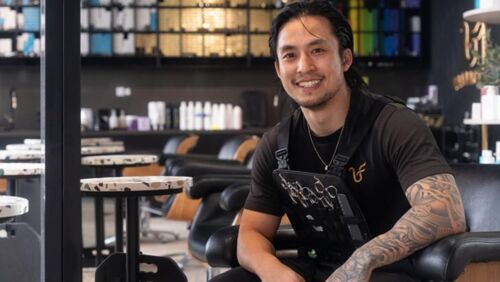Sam Penny on cheese, challenges and swimming the English Channel
Sam Penny - together with his partner Helen Shadforth - established Cheese Therapy to support small cheesemakers affected by bushfires. When COVID-19 hit, the company became essential to their survival, and some of the cheesemakers he works with say that 2020 has been their best year.
Always up for a challenge, Sam, who has previously swum across the English Channel, decided to up the ante and become the first person to swim it in winter.
After taking to the Channel in December 2018, Sam developed hypothermia and was unable to continue. However, he says the feedback he received after this was one of his greatest lessons - not to be afraid of failure.
What was your first job?
I had two jobs that started at the same time. I was a cleaner at a cleaning supply place - I'd mow lawns, wash cars, and clean the warehouse. The second one was as a council lifeguard on school holidays at Alexandra Headland Beach when I was 15. My first full-time job was in the Australian Defence Force Academy studying civil engineering, but the military and I came to the mutual decision that it wasn't the best place for me to be. I finished my degree at QUT in Brisbane and went to work as a civil engineer at Leighton Contractors.
What's the best money advice you've ever received?
Any money you have is a reflection of your past and not your future. I'm a very forward-thinking person, looking into what can I do now, and what strategies I can put into place to build the business. For example, trying to better myself. I have a mantra to always be better than I was yesterday and that's the same mantra I try to instill in my team. I focus on life enjoyment and the thrill I get from building my business. Cheese Therapy has such a positive value to showcasing artisans. I see money just as a measure of how well we are doing.
What's the best investment decision you've made?
All the adventures I've done, for example, my winter Channel coursing attempt, has taught so much about myself and the human race in general, and how they respond. That has really allowed me to lead my team and business better. It's not a cheap thing to do those things (the attempt cost about $20,000), but doing things like that allows me to learn more about myself and become a better leader.
What's the worst investment decision you've made?
I decided I was going to start a chain of hair salons. I had a view that hair salons had lost a lot of five-star treatment they used to have where people felt they were swept into another world. But I found it's such a cottage industry, which is why we don't see any dominant brands in the market. I lost a lot of money there.
What is your favourite thing to splurge on?
I think it would be a great bottle of wine, something 20-years-old that has so much flavour and character to it, and sitting down with partner Helen on our deck on the Sunshine Coast enjoying the moment and really enjoying being together.
If you had $10,000 where would you invest it?
I would invest it in my next adventure - I don't know what that is yet. My adventures seem to happen quite spontaneously; they're only planned three months out and they're always things that will push me well beyond I thought I will go, but will help me to learn more about myself.
What would you do if you only had $50 left in the bank?
I would take my kids down to the beach and have an ice-cream.
Do you intend to leave an inheritance?
It's not in my mind at all - I certainly hope they will have something but I also hope they are going to be strong enough to stand on their own two feet, anything left behind will just be a bonus for them.
What's next for your business?
In 2021, we're looking to do a capital raising. We've started to move into some other industries. Last week we launched Australian-grown coffee beans from far north Queensland and Byron Bay. Our coffee growers grow a great bean but the output is too small. By being able to support these growers and promote to our very large customer base, we can see a lot of investment into the region. The Atherton Tablelands is a growing food bowl - including coffee. It doesn't make sense for us to bring beans 15,000 kilometres from Colombia when we have it in our own backyard.
We'll also be working with small winemakers - there are small family vineyards without a cellar door where buyers need to make an appointment to visit, such as in Bellarine in Victoria and Mudgee in the NSW central west - that don't have marketing dollars behind them. That's a similar model to what we've been able to do with cheesemakers, promoting them on the national stage
And in 2021 we will be moving to sell into international markets as well.
We've always offered international cheeses as part of our business and it provides a benchmark for our Australian makers.
Would you like to see any changes with the way people look at money post COVID?
I think a big thing is being able to enjoy the hard work you've done. I work bloody hard but also love what I do, I think people need to have a much greater relationship between 'Scrooging' for the next 20 years to put money into their house and not enjoying themselves in the moment.
Finish this sentence: money...
... makes you realise the work you're currently doing is sustainable and worthwhile.
Get stories like this in our newsletters.



